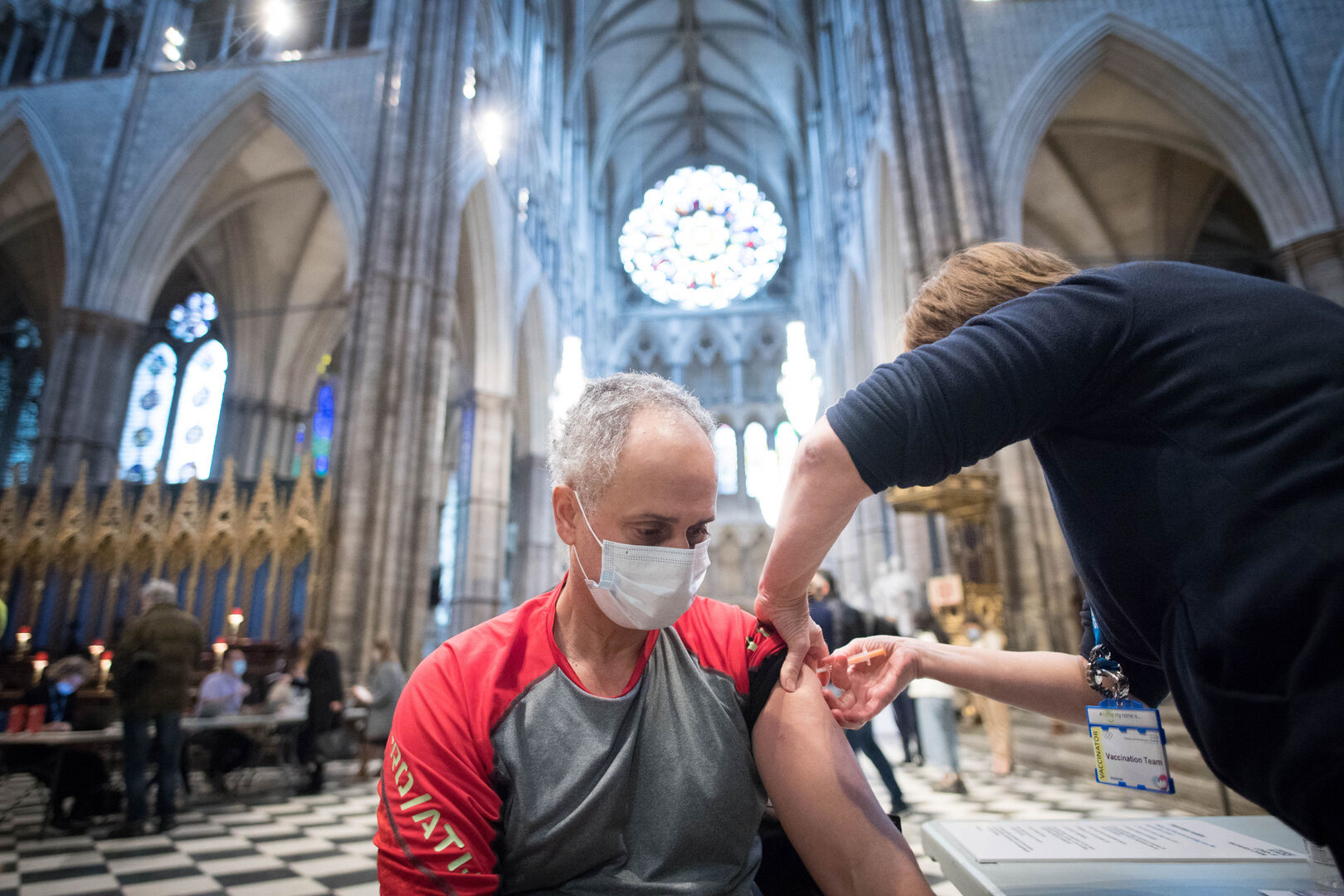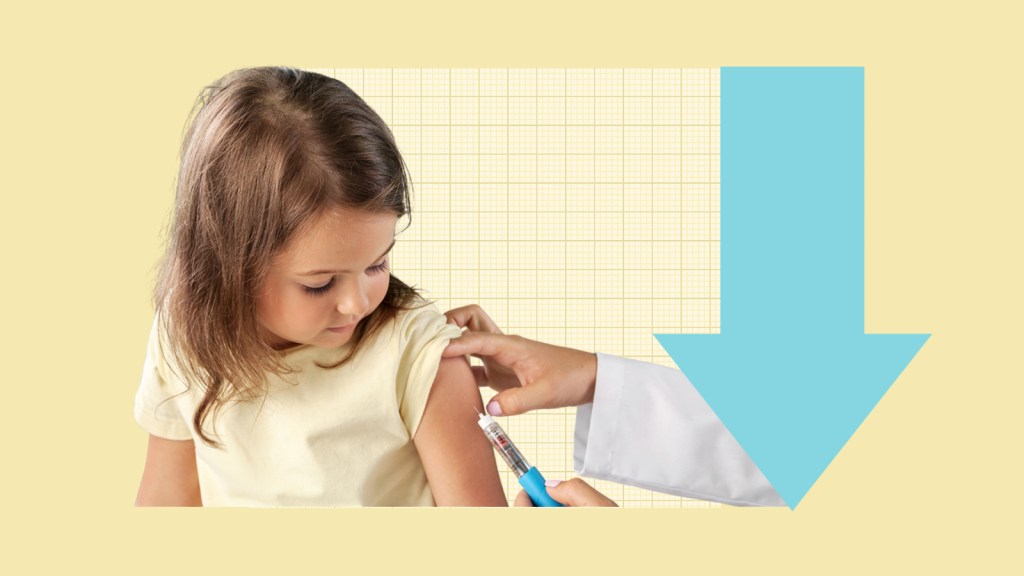Child Vaccination Rates Drop to Lowest Levels in a Decade in the UK
In the United Kingdom, the vaccination rates for children against routine diseases such as measles and whooping cough have plummeted to their lowest point in over ten years.
This decline, indicative of increased vaccine hesitancy, means that the UK is now falling short of the World Health Organisation’s (WHO) recommended 95% vaccination coverage by age five for routine immunizations. This puts the nation at risk for serious outbreaks of preventable diseases among children.
Last year, England recorded 2,911 confirmed cases of measles, the highest number since 2012, with notable outbreaks in cities like Birmingham and London. In 2024, there were 14,894 confirmed whooping cough cases, and tragically, 11 infants lost their lives.
The WHO advises that a 95% immunization rate is crucial for achieving herd immunity necessary for eliminating or controlling diseases.
Children are expected to receive the MMR vaccine, which protects against measles, mumps, and rubella; the six-in-one vaccine that guards against diphtheria, tetanus, whooping cough, polio, Haemophilus influenzae type b, and hepatitis B; as well as the pneumococcal conjugate vaccine. Vaccinations against meningitis B and C are also given. It is possible to catch up on missed vaccinations at any age.
Vaccination rates for the six-in-one vaccine have decreased from 89% in 2014 to 83% in 2024. For the MMR vaccine, the rate has dropped from 88% to 84%.
In addition, the pneumococcal conjugate vaccine coverage fell from 92% to 88%, and meningitis vaccine rates decreased from 92% to 89%.
London accounts for the lowest childhood vaccination rates, with data revealing that in Hackney, east London, only 60% coverage exists for the MMR vaccine.
The decline in MMR uptake has been linked to the false claims made by disgraced doctor Andrew Wakefield in 1998. Following a dip to 80% in 2003-04, rates improved after the misinformation was debunked, reaching 89% in 2015, but have since continuously declined.
An increasing anti-vaccine sentiment has emerged, with recent polling indicating a notable rise in the belief among British adults that vaccines lead to harmful effects. YouGov surveys show that the percentage of individuals holding this belief has surged from 14% at the onset of the Covid-19 vaccine rollout to 34% this year.
In response to this vaccination crisis, Health Secretary Wes Streeting is proposing new powers for 6,000 health visitors, enabling them to administer vaccinations to children during home visits.
Streeting’s plan aims to extend these powers to all health visitors by 2027, with pilot programs set to begin in various regions this year.
Health visitors will focus on administering flu vaccines and other routine immunizations to improve vaccination uptake among preschool children up to the age of five. They will also work to vaccinate children who may have missed vaccinations previously.
Streeting expressed concern over the rise in preventable diseases among children, stating, “To witness illnesses that can be completely avoided affecting children, sometimes even leading to fatalities, is heartbreaking. We must renew our efforts to reverse the decline in childhood vaccination rates witnessed over the past decade.”
He emphasized that empowering health visitors would place them at the forefront of combating preventable diseases, asserting that this pragmatic measure will be instrumental in safeguarding children and contributing to their healthy development.

By the end of the month, pilot locations will be selected to commence operations later this year. If successful, these initiatives will be expanded across the country.
These proposals are part of Labour’s strategy to alleviate the long wait times in ambulance services and emergency departments, released last Friday.
Dr. Julie Yates, the deputy director for immunisation at the UK Health Security Agency, remarked on the decline in routine childhood vaccinations, including MMR and flu shots, which have left thousands of children vulnerable to potential outbreaks linked to nurseries and schools.
She noted that taking vaccination services into homes offers a crucial avenue to counteract the decline and support parents by providing greater flexibility, particularly in areas with lower vaccination rates.
The Department of Health has indicated that for every 1,000 childhood vaccinations performed, four hospital admissions are prevented.
As of 2023, 10% of British children aged between 12 and 23 months have not received their first measles vaccination, marking the poorest rate among G7 nations, according to the World Health Organisation.
Concerns Over Mistrust

Local NHS regions have been instructed to devise strategies to enhance vaccine uptake by this winter, which includes simplifying booking processes for flu vaccines and identifying walk-in pharmacies that provide vaccinations.
Dr. Yasmin Razak, a GP partner in North Kensington, where MMR vaccination rates hover around 64%, highlighted the realities of vaccine hesitancy. She stated, “In our area, which contains some of the most deprived wards in northwest London, there is significant mistrust. People are often anxious, and language barriers contribute to misconceptions that hinder in-depth discussions.”
She noted that the experiences surrounding Covid-19 have increased skepticism, remarking that sometimes mothers become reticent when vaccination discussions arise.
Dr. Razak continued, “Vaccines are a source of wariness since Covid. There has been widespread fear and misinformation. While the Pfizer vaccine proved incredibly effective, side effects from the AstraZeneca vaccine caused hesitance to grow.”
The lingering myth linking MMR to autism persists, with Dr. Razak noting, “The concern about autism, a debunked association, remains prevalent. With higher autism rates, people are inquiring about the underlying causes, despite evidence disproving the link.”
She mentioned that misinformation shared on social media exacerbates these fears, showcasing alarming images that instill additional fear.
Dr. Razak expressed support for Streeting’s initiative regarding health visitors, recognizing their training and ability to engage with families in their homes to alleviate concerns surrounding vaccinations.
She added, “We gained significant insights from Covid; returning to our community training approach is essential for rebuilding trust.”
Last week, data revealed that only one-third of NHS frontline staff received the seasonal flu vaccine last winter, coinciding with 5,000 patients hospitalized daily due to flu at the peak in January. Over 7,750 individuals died from flu-related causes last year, doubling the number compared to the previous winter.
This winter, NHS trusts have been directed to enhance vaccination rates among frontline staff, aiming to restore numbers to pre-pandemic levels last seen in 2018-19, translating to an increase of at least five percentage points—equating to 57,000 more staff members receiving their vaccinations.
Additionally, the goal of eradicating cervical cancer in England by 2040 faces jeopardy as HPV vaccination rates for girls and boys have plunged from 90% before the pandemic to just over 70% last year.
Public Sentiment on Vaccination
Ed Hodgson, associate director for polling and analysis at More in Common, indicated that some individuals’ reluctance towards vaccines stems from feelings of being controlled by governmental measures.
He stated, “There is a segment that perceives the government as untrustworthy, which has contributed to declining trust in experts and politicians, driven by events such as partygate and the PPE scandal.”
Hodgson further noted, “During focus group discussions concerning corruption and trust in politicians, Covid-19 often arises as a reference point. We encounter individuals recounting experiences that don’t align with facts, stating they never contracted Covid until they received their vaccine, then subsequently experienced multiple infections, despite not mixing socially before vaccination.”
Surveys revealed that if another pandemic of a similar scale were to arise, 28% of respondents indicated they would be unlikely to comply with government isolation directives. Additionally, 37% believe it is “probably or definitely true” that the government exaggerated the pandemic for control purposes.
While children no longer routinely receive the BCG vaccine for tuberculosis, it remains available for high-risk infants. Missed vaccinations can be administered at any time.
Dr. Amanda Doyle, national director for primary care at NHS England, emphasized, “Every year, we reach out to parents and guardians through letters, texts, and emails to encourage vaccination appointments. We acknowledge the obstacles busy parents face, and bolstering access to vaccines is a crucial element of our strategy.”
She concluded, “We aim to protect as many children as possible from serious illness, and our new initiative involving home visits targets those who have not yet come forward to receive their vaccinations, thereby safeguarding both children and their communities.”




Post Comment